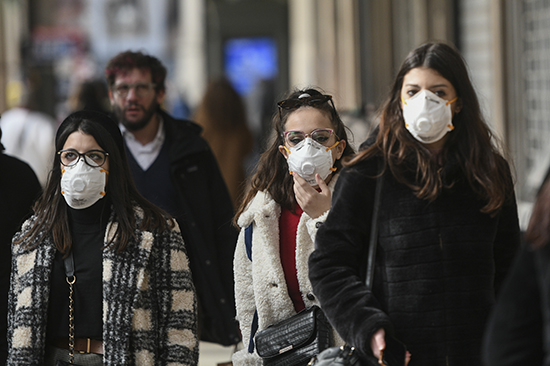Coronavirus and Its Impact on Multifamily
On March 11th, the World Health Organization declared the Coronavirus to be a worldwide pandemic. Community spread of the virus is increasing, creating “hot zones” in New York, California, and Washington state. Financial markets are reeling, fear is rising, the sudden economic shock is likely to have lasting consequences, and Dr. Anthony Fauci, director of the National Institute of Allergy and Infectious Diseases, says it is going to get worse.
How much worse is somewhat dependent upon the ability of public health authorities to contain the spread, increase testing, and approve a treatment protocol In addition, it is dependent upon all of us to take the necessary steps to limit person to person transmission.
In short, there is a great deal of uncertainty at the moment and a resolution timeline is far from clear. As multifamily Owners/Operators, it is more likely than not that there is going to be a direct impact on our business and we need to move quickly to get ahead of it and mitigate risk where possible. Naturally, this begs the question, what should we do?
We believe that the impact will be sudden, swift, and painful for those that aren’t prepared. Today, we think that there are a series of actions that can be taken across four dimensions of ownership to reduce risk and position your assets to weather a protected economic downturn. The dimensions are:
- Financial
- Community
- Communication
- Vendor Management
Let’s go through each one of them in detail.
Financial
It is a chaotic time in the financial markets. Some data points to consider:
March 11th marked the official end of the current bull market in stocks. It began in March of 2009 and from trough to peak, the S&P 500 rose nearly 300% over 11 years. From the Feb 12th, 2020 peak, to the March 11th, 2020 close, the Dow Jones declined 20.2%, officially bear market territory.

- On Monday, March 9th, the entire yield curve for United States Treasuries fell below 1% for the first time ever, signaling the financial markets growing fears of a global recession and massive rotation out of risk assets.
- In response, the Federal Reserve issued an emergency interest rate cut of 50bps on March 3rd. Further, interest rate futures contracts are signaling a 100% chance of a further rate cut in March. Some market participants believe that rates could fall to 0%. It would be the Fed’s largest rate cut since December 2008.
- Finally, a surprise oil price war has broken out between the Russians and Saudis that appears to be aimed at putting American shale oil producers and frackers out of business. Highly leveraged companies in states with significant energy production like Texas are particularly vulnerable and are likely to see job losses.
What does this mean for our multifamily investments? We think it means two things right now:
- We think it means job losses. Between the coronavirus and the oil price war, we believe that hourly workers, those with inadequate health insurance, and individuals whose jobs are tied to oil production, hospitality, travel, or food service are particularly vulnerable. Job losses equals increasing delinquencies, collection costs, and vacancy.
- But, falling interest rates also means lower borrowing costs and a potential further reduction in cap rates given the slide in the 10-year treasury yield. When the dust settles, this is generally a long term positive.
What can you do to prepare? We think there are four key steps:
- Generate cash: In times of uncertainty, liquidity allows us to: (1) Endure economic contractions and/or support our assets through periods of increased vacancy; and (2) take advantage of additional acquisition opportunities from owners who need to sell.
- Look for Opportunities to Refinance: Keep an eye on interest rates and proactively take advantage of opportunities to refinance and reduce debt service payments. Doing so can generate cash to fund operating reserves and future acquisitions.
- Study Your Rent Roll: Again, we think hourly workers, those whose jobs are tied to the energy industry, and anyone employed in the hospitality, dining, aviation, lodging, convention, or travel industries are particularly at risk for job loss. If your rent roll or tenant base is highly levered to one or more of these industries, your reserves and liquidity needs may be higher. Prepare accordingly.
- Lock in Renewals: To limit vacancies, it may be a good idea to proactively lock in lease renewals for individuals who are at or near the end of their lease term. Doing so will provide additional cash flow stability to support the property as we work our way through this economic shock.
Let’s talk about Community next.
Community
24 hour news headlines, social media disinformation, and a general fear of contracting the virus are leading to a rise in anxiety, especially for those with pre-existing mental health conditions. In addition, hate crimes are on the rise, particularly for individuals of Asian origin.
While the financial impact of this dimension is much less clear, it is obvious that as owners of places where people live, sometimes in close proximity, it is likely that we will have to deal with the ramifications of individual anxiety and the potential stereotyping associated with the origin of the coronavirus.
Perhaps our primary duty as multifamily owners and operators is to provide a safe and healthy environment for our residents. To soothe anxieties and protect vulnerable residents, we think that there are 3 key actions that can be taken:
- Be Proactive: We think it is important to have a plan and to proactively execute it to ensure resident safety. Redoubling our effort to clean and disinfect common areas, stair railings, computer screens, and other vulnerable surfaces to help to reassure residents that we are taking steps to protect their health.
- Be Visible: Being visible and accessible and actively seeking to reassure residents through both words and actions may go a long way in helping to calm anxious residents.
- Stick to the Facts: During interactions with residents, it is important to project calm and to stick to the facts. The United States Center for Disease Control, State Department Travel Advisories , and the Harvard Health Coronavirus Resource Center are good, fact based, sources of information.
Communication
We have to be honest with ourselves that in our line of business, individuals are living in close proximity to each other, sharing common spaces, and coming and going from numerous places that could increase the risk of an infected resident spreading the virus from one person to another. Senior living facilities provide all the evidence that we need to know that the virus can spread quickly among residents and be devastating for those with underlying medical conditions.
We have to be prepared to communicate both with residents and with local health authorities in the event that one of our residents is infected. We think there are 3 important steps that must be taken to prepare for what may be inevitable for many of us:
- Establish/Update a direct line of communication to residents: In the event that one of our residents becomes ill, it isn’t hard to imagine that the panic level will ratchet up many notches. We need to have a direct line of communication to our residents like email or text to clearly explain the situation and actions that are being taken to protect others.
- Establish a direct line of communication to local health authorities: In the event of an emergency, we need to know who to contact and we need to be ready to do it quickly. Compile a list of the closest hospitals, urgent care clinics, and civic authorities to be prepared for their instructions on how to handle an outbreak. If one resident is infected, the likelihood that more than one is infected may be higher and we need to be able to move quickly to coordinate next steps with local authorities.
- Communicate Steps Being Taken or Restrictions Being Put In Place: To reassure residents we should proactively communicate with our residents the steps that are being taken to protect their health OR, if restrictions on movement or use of common areas becomes necessary, we should be prepared to communicate that as well.
But, residents aren’t the only people on site throughout the day. Let’s talk next about our final category, Vendors and Visitors.
Vendors & Visitors
Residents aren’t the only ones on property on a daily basis. We may also have employees, vendors, and visitors that normally come and go without much thought. In addition, it is common to rely on vendors, like a property management company, or technology tools to run our properties on a day to day basis. On this front, we need to do a few things to prepare for the prospect of having to screen all vendors and visitors or suddenly losing a relied upon vendor due to illness or financial hardship.
- Identify Key Vendors & Technology Tools And Develop Contingency Plans: What if a property manager becomes ill? Or, what if they go out of business? Either way, the sudden loss of a key vendor or technology tool could create a difficult situation. We should use this time as an inflection point to identify our critical dependencies and plan for life without them.
- Consider What a Screening Protocol Would Look Like: Should one of our residents become ill, it isn’t out of the question that local authorities would place our entire property under quarantine. Granted, this is a worst case scenario, but we should spend some time thinking about the entries and exits to our properties and how we or local authorities may have to monitor and/or screen individuals coming and going.
- Consider the Financial Health of Key Vendors: This economic shock is likely going to have far reaching consequences. But, it is too early to determine exactly how it will play out. Like residents, it may make sense to evaluate the financial health of key vendors to ensure that they have the capacity to endure an extended economic contraction or sudden illness of one of their key employees.
Conclusions and Final Thoughts
Above all, the key is to remain calm, understand where the risks are, mitigate them where possible, and support our residents through what are likely to be some tough times ahead.




